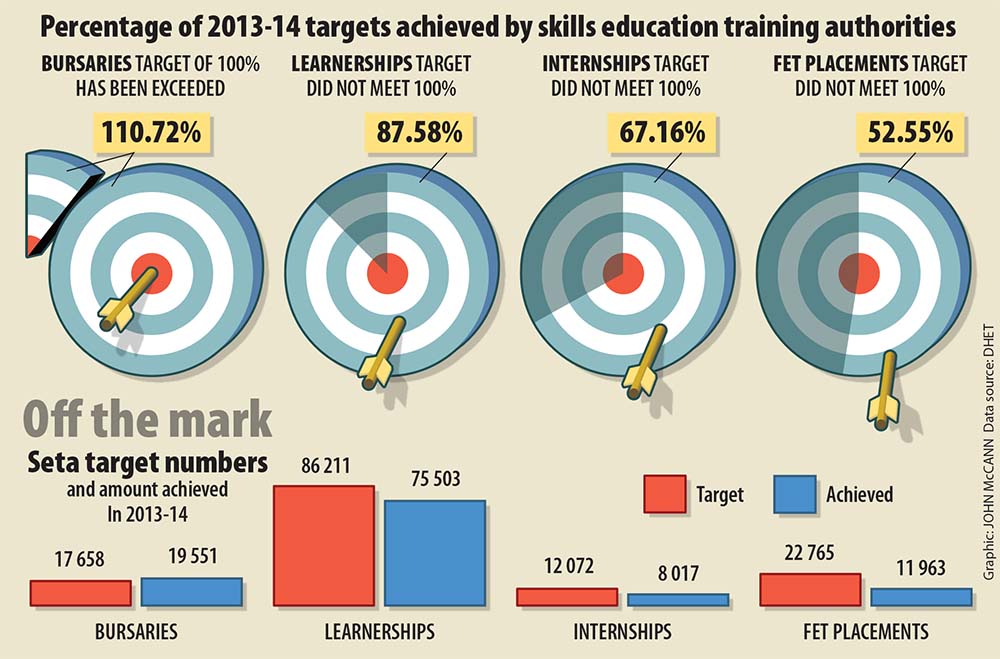Reject: Blade Nzimande calls a story by Rapport ‘mischievous’ when it said the minister indirectly gained from Seta money.
Higher Education and Training Minister Blade Nzimande is manoeuvring at speed to take full control of the 21 Sector Education and Training Authorities – and their collectively enormous budget – and the Setas are giving him all the leverage he needs.
“Collectively, the Setas have failed to disburse the levies collected, meaning that training that could have occurred did not,” Nzimande said in the latest proposal to restructure the ever-troublesome bodies.
“For example, R2.6-billion was not committed or allocated at the end of the 2014-2015 financial year, and was instead transferred to NSF [National Skills Fund],” said Nzimande.
“Many Setas have failed to meet the annual targets agreed to in their annual performance plans approved by the minister, and the service level agreements signed with the director general of higher education and training.”
The Setas, established in their current form in 2000, are funded through a 1% skills levy on the salary of every worker in the country, which in the 2014-2015 financial year totalled R11-billion – considerably more than the R9.5-billion allocated to the National Student Financial Aid Scheme to fund 205?000 university and 200?000 college students.
The bodies are intended to target the 3.4-million people between the ages of 18 and 24 who are not employed, not in training, and not receiving further education. These young people, the theory goes, can be assisted in building better lives for themselves through learnerships and apprenticeships, and a huge pool of skilled people with training tailored to industry needs are fed into the economy.

But the implementation has fallen woefully short. Nzimande wants to do away with the semi-autonomous status the Setas enjoy and, instead, turn them into advisory boards his department can call on. His proposal will see the institutions renamed Sector Education and Training Advisory Boards (Setabs).
Seta officials referred Mail & Guardian questions for comment to the spokesperson of a forum for Seta chief executives, who did not respond.
The case against the Setas is well founded. Nzimande vowed to knock the often-criticised bodies into shape when he took office in 2009, but improvement has been limited. Data from the department shows Setas targeted 138?706 youth for learnerships, internships and bursaries in 2013-2014, but only reached 115?034.
“There have been persistent challenges with the governance of certain Setas. For example, in 2013-2014 one Seta was placed under administration and in 2014-2015 two more Setas were placed under administration,” Nzimande said in his proposal for a radical restructure.
In 2015 the Setas for safety and security and for culture, arts, tourism, hospitality and sports were placed under administration. Between them the two bodies were found to have spent R250-million irregularly in the past financial year.
The construction Seta is under investigation after allegations of abuse of its authority by some of it officials.
Nzimande also complained that various Setas often delayed releasing grants meant to encourage employers to take on interns. “This impacts on the ability of the system to be timeously responsive to skills needs.”
The proposed restructure, due to be decided on during 2016, would see the NSF, a unit based in the higher education department, control most of the Setas’ budgets. That would give Nzimande the ability to redirect up to 40% of the total funds available as training grants.
“Setas must justify when they need that money,” said Khaye Nkwanyana, higher education spokesperson. “NSF can decline any project that is not viable.”
If that works, the remaining concern will be companies’ willingness to take on young people for training. “Some companies are resistant. Some are not even contributing to the skills levy,” Nkwanyana said. “Companies have not played ball and we’re concerned.”
Minister slams cash cow claim
Higher Education and Training Minister Blade Nzimande has been accused of treating Setas as a cash cow, allegations he has roundly rejected.
In November, Sunday paper Rapport said two organisations linked to Nzimande, the South African Communist Party (SACP)and the Dambuza Community Development Trust (Damcom), were benefiting from Seta money.
Damcom, which Nzimande founded in his home town of KwaDambuza, outside Pietermaritzburg in KwaZulu-Natal, has received R11-million from two Setas for training projects in 2012 and this year.
The SACP’s investment company, Masincazelane Investments, reportedly got R235-million from a Seta through a private training college, Letsatsi.
The party, of which Nzimande is general secretary, has shares in the college.
Nzimande has rejected both reports. He said he cut ties with Damcom in 2009 when he became a minister and that Rapport’s report on Masincazelane was mischievous because Letsatsi has been providing training to Setas since 2002.